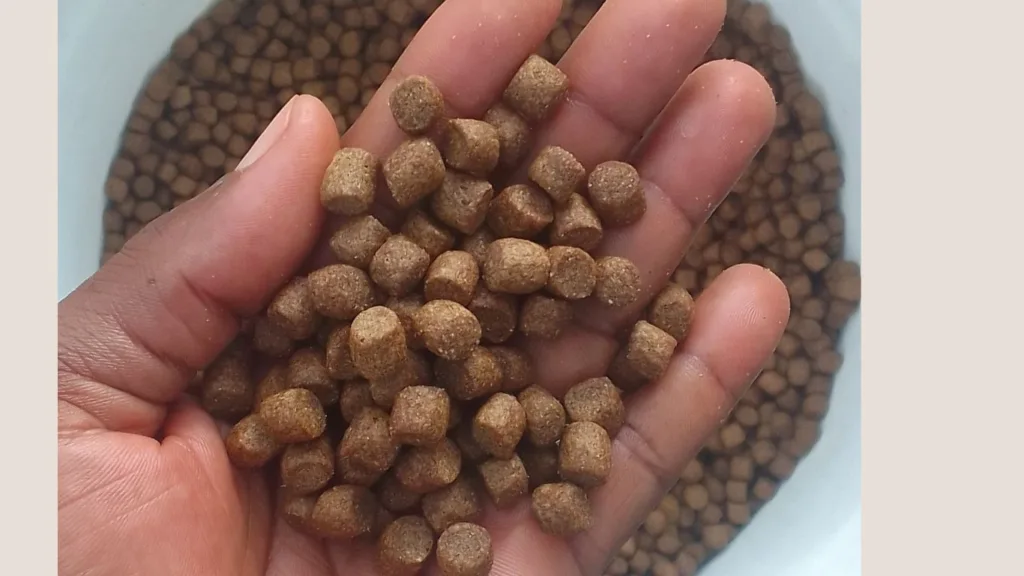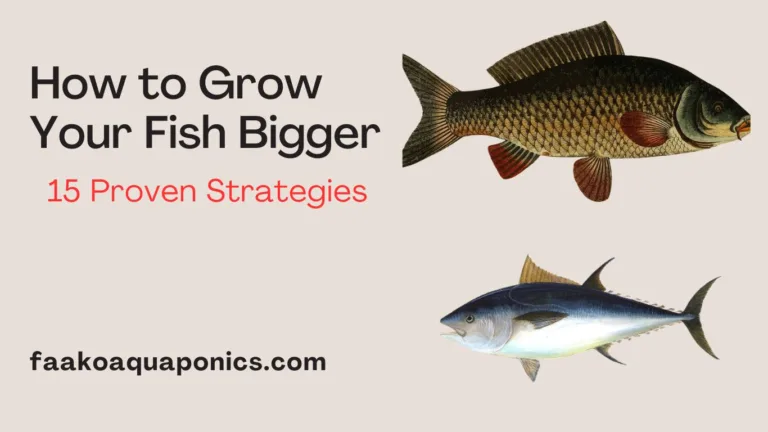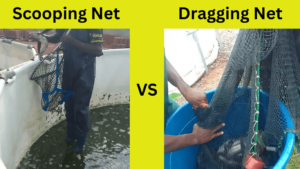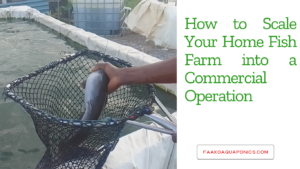Achieving bigger fish growth is the ultimate dream of every fish farmer. Growing fish bigger requires careful attention to various factors, from nutrition to habitat maintenance. Whether you’re a hobbyist or a commercial fish farmer, these proven strategies will help you foster optimal conditions for robust fish growth in your aquatic environment.
1. Choosing the Right Pond
Be it earthen, concrete ponds, tarpaulin, plastic, or any other method of raising fish, pond capacity, must support the number of fish stocked with due consideration to the sizes you intend to achieve at the end of the season. Experience has taught me that fish perform better in relatively deep ponds compared to shallow ones.
Different fish types grow in different ponds and you have to study to know the type of fish and the corresponding pond which will give you maximum fish growth
2. Choosing the Right Breed
Breed is a major determinant of how big your fish will be at the end of a targeted period. A poorly bred fish may not grow to its full potential due to breeding errors. Some breeds of fish are better when raising big-size fish than others.
For instance, heteroclarias, otherwise called hybrid by some farmers, can grow to 3kg in six months — all things are equal. That does not mean pure clarias, which is a common breed in Africa, is not good. (This example is for catfish)
If breeding fish for growth, selectively breed individuals with desirable traits over successive generations. This selective breeding process can enhance the overall growth potential of your fish population.
3. Reasonable Stocking Density
You can’t violate stocking rules and still expect exceptional performance from your fish. You should understock your ponds when you dream of raising big fish.
When fish are overstocked, they compete for resources such as space, food, and oxygen. All these will affect their growth and also will increase cannibalism and also mortality.
To determine the right number to stock, many factors must be considered. Factors like the previous performance of your pond, prevailing weather conditions, expected rate of mortality, and available running capital among others.
4. Select the Right Fish Feed
To fuel optimal growth, prioritize feeding your fish with high-quality, nutrient-rich food specifically formulated for their dietary needs. Look for feeds with balanced protein, fat, and essential vitamins and minerals to support healthy development and maximum growth potential.
The first four weeks of your fish are very important because they determine the likely result of your fish. This is the bitter truth many farmers neglect.
The sizes of feeds for your fish must be what 95 percent of them can pick well without stress. Ensure you use the right quality of feed. Don’t cut costs and compromise quality.
the feed is pelleted into different sizes depending on the age and size of your fish. It ranges from 1.0mm to 8.0mm

8.0mm type of fish feed
5. Implement Regular Feeding Schedules
Consistency is key when it comes to feeding your fish. Establish a regular feeding schedule and stick to it, providing balanced meals in appropriate portions to support steady growth and prevent underfeeding or overfeeding since each of them has negative effects on your fish.
Also, make sure that you do not feed your fish when the weather is too hot or too cold. You need always give a balance. During sunny days, feed them early in the morning and when late in the evening.
And for the number of times you should feed them, is up to you but mostly when they are about 1 – 4 months, most people choose to feed them twice a day, that is morning and evening. And when they are above 4 months, you can feed them once a day. When they are fingerlings, some feed them thrice a day.
6. Reliable Water Source(s)
Water management is what every fish farmer must learn. You must know when to change or refresh your pond water. Work on the quality of your water regularly. Depending on a seasonal, unreliable source of water may cut short your vision of raising big fish.
Also, note that not all water you consider good may be good for your fish. Often, natural body water sources like dams, lakes, wells, and boreholes are considered healthy and fresh for fish. Water sources that are mixed with chlorine and other chemicals are not recommended for a fish farm. In case is the only option for you, then you need to treat it before.
Regularly test and maintain optimal water quality parameters such as pH, ammonia, nitrites, and nitrates.
Clean, well-oxygenated water free from harmful pollutants is essential for promoting healthy metabolic functions and robust growth in fish.
Ensure you have an alternative source of water as a backup in case of unforeseen circumstances like delayed rain, drought, and contamination of water sources. That is water storing facilities like a reservoir.
7. Regularly Monitor and Manage Fish Health
Stay vigilant for signs of illness or stress in your fish population, and take prompt action to address any issues that arise. Regular monitoring and proactive management contribute to overall fish health and growth.
Don’t engage an inexperienced worker on your farm. If you must engage one, ensure you are there to supervise him. Monitor your feeding because they might need to eat more than books recommend.
Always make sure your farm workers get adequate training before operating the fish farm
8. Right Timing
Do not be in haste to sell your fish. Plan the time you want to sell before you stock. You just have to wait for the right time. Wait for your fish to grow in size and weight.
When to stock your fish, when to feed your fish, when to sort your fish, when to harvest your fish, and anything that has to do with time must be well-timed to avoid complications.
You may check out this article for detailed information about when to sort your fish.
9. Provide Adequate Sunlight
Ensure your pond receives sufficient sunlight to stimulate natural food production, such as algae and plankton. These organisms serve as additional food sources for your fish, promoting healthy growth and vitality.
But also make sure that there is not too much sun since the water may get hot and cause fish mortality too. That is when there is a need for a greenhouse in your fish farm to be able to control the weather conditions.
10. Practice Fish Sorting
Fish sorting is the process of selecting and grouping fish according to their sizes, colors, species, and other similar characteristics. This is often done to reduce cannibalism, ensure equal growth, and maximize profit.
Check out HERE for a full article on Fish Sorting including.
11. Optimize Aeration and Circulation
Adequate aeration and water circulation are vital for delivering oxygen and nutrients throughout the pond, facilitating efficient metabolism and growth.
Invest in reliable aeration systems to maintain optimal oxygen levels and prevent stagnation.
That is why there is a need to introduce the Recycling Aquatic System (RAS) to your fish pond.
12. Supplement with Natural Foods
Incorporate live foods such as worms, insects, or aquatic plants into your fish’s diet to add variety and stimulate natural foraging behaviors. These supplemental foods can provide essential nutrients and promote healthy growth.
13. Perform Regular Maintenance
Keep your pond clean and well-maintained to create an optimal environment for fish growth. Remove debris, manage algae growth, and trim plants as needed to prevent nutrient imbalances and maintain water quality.
If you are using pumps (RAS) and other equipment, make sure to always keep them clean to ensure long lifespan and fish, proper function, and fish growth.
14. Monitor and Control Predators
Protect your fish from predators such as birds, raccoons, or larger fish species by installing nets or other deterrents. Minimizing predation pressure helps ensure your fish can grow without interference.
Also do sorting regularly to reduce predator fish attacking and consuming other species, thus preventing or reducing cannibalism.

Fish predator bird and a pond covered with net to prevent the predators
15. Medication
Always check the health of your fish and provide medicine to the fish from time to time. You can treat your fish pond with salt, that is what we call Salting. Introducing salt into your fish pond. You can also add bitter leaves to the pond. All these are local methods of treating your fish. Both methods reduce stress, and cannibalism, and have other numerous benefits.
You can also contact fish experts to recommend medication for you.
Conclusion
Achieving bigger fish growth in your pond requires a holistic approach that addresses various factors influencing fish health and development. By implementing these proven strategies and maintaining a balanced ecosystem, you can create an environment conducive to robust growth and thriving fish populations. Here’s to the success of your aquatic endeavors and the satisfaction of witnessing your fish reach their full growth potential!




When I initially commented I seem to have clicked on the -Notify me when new comments are added- checkbox and now every time a comment is added I recieve 4 emails with the same comment. Is there an easy method you can remove me from that service? Thanks.
An impressive share! I have just forwarded this onto a coworker who was doing a little homework on this. And he in fact ordered me lunch simply because I discovered it for him… lol. So let me reword this…. Thanks for the meal!! But yeah, thanks for spending time to talk about this subject here on your blog.
Excellent web site you have got here.. It’s difficult to find excellent writing like yours nowadays. I seriously appreciate individuals like you! Take care!!
I was very pleased to find this page. I wanted to thank you for your time just for this wonderful read!! I definitely appreciated every bit of it and i also have you book-marked to check out new things on your website.
Great site you have got here.. It’s hard to find quality writing like yours nowadays. I seriously appreciate individuals like you! Take care!!
There is definately a lot to know about this subject. I really like all the points you made.
Everything is very open with a precise description of the issues. It was definitely informative. Your website is extremely helpful. Many thanks for sharing!
Hello! I could have sworn I’ve been to this web site before but after looking at some of the posts I realized it’s new to me. Nonetheless, I’m definitely pleased I stumbled upon it and I’ll be bookmarking it and checking back regularly!
That is a great tip particularly to those fresh to the blogosphere. Simple but very precise information… Thanks for sharing this one. A must read post.
Hi, I do believe this is a great blog. I stumbledupon it 😉 I am going to revisit once again since I book marked it. Money and freedom is the best way to change, may you be rich and continue to guide other people.
Everyone loves it when individuals get together and share ideas. Great site, continue the good work.
Hi” best wishes to you and your very nice blog,
Good day! This post could not be written any better! Reading through this post reminds me of my good old room mate!
He always kept chatting about this. I will forward this page to him.
Fairly certain he will have a good read. Thank you for sharing!
You really make it appear really easy together with your presentation however I to find this matter to
be really one thing that I feel I might by no means understand.
It sort of feels too complicated and very wide for me.
I am having a look forward in your subsequent post, I will attempt to get the hang of it!
Najlepsze escape roomy
Have you ever considered about including a little
bit more than just your articles? I mean, what you
say is important and everything. But imagine if you added
some great graphics or video clips to give your posts more, “pop”!
Your content is excellent but with pics and videos, this site could certainly be one of the greatest in its field.
Excellent blog!
We are a group of volunteers and opening a new scheme in our community.
Your web site provided us with valuable info to work on. You’ve done
a formidable job and our whole community will be thankful to you.
I am very glad to hear this. I’m happy my writeups are impactful. Thanks for your time.